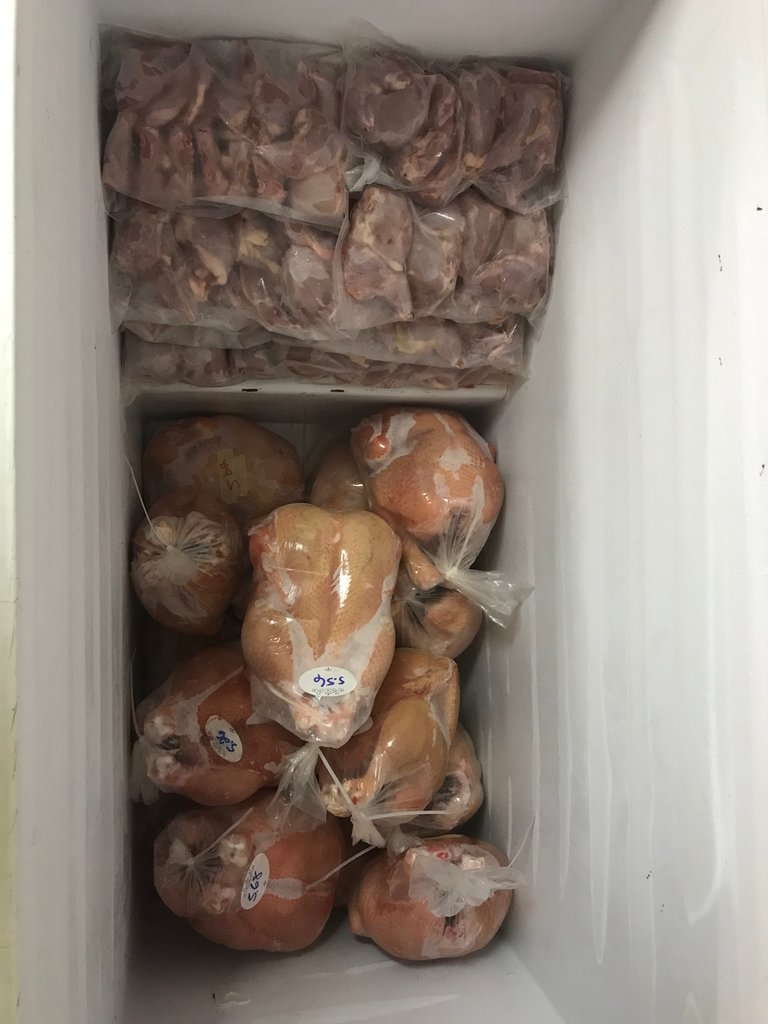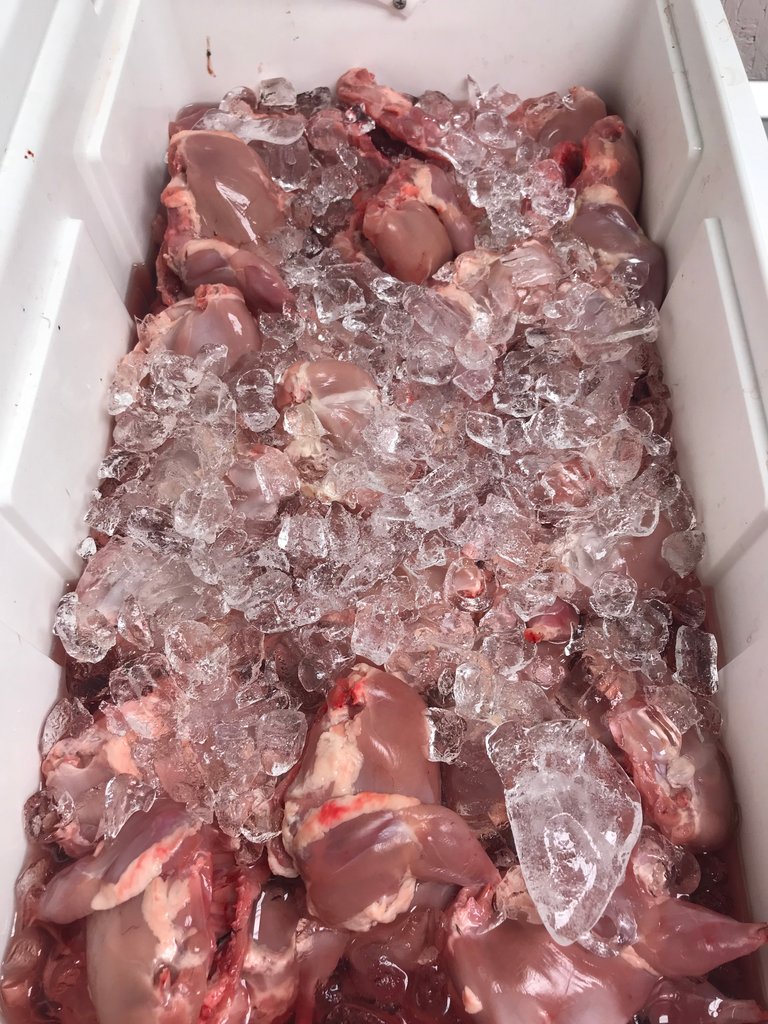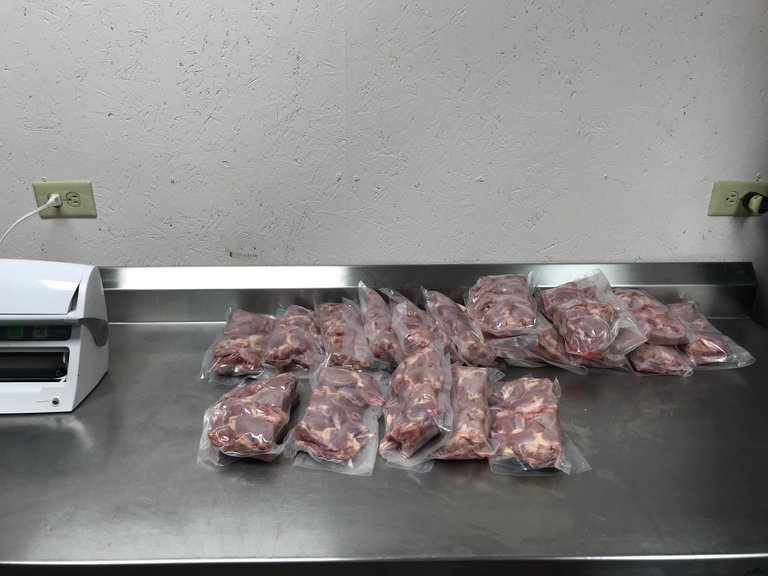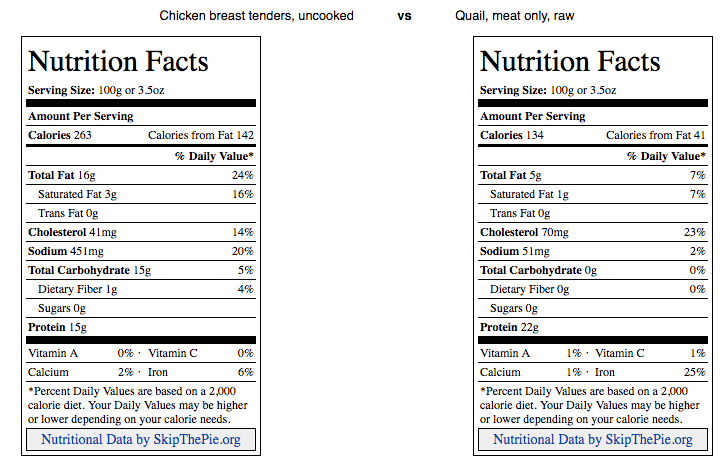Check out the last picture for information as to why we prefer quail - nutritionally
For those of you that don't know, we pasture raise our quail just like we do our chickens. This gives them more of a natural type environment without having to stand on metal grates their whole lives and subsequently makes the meat healthier when they are able to eat bugs, seeds etc.

They look good sitting next to the overflow of pastured chickens in the freezer!

~100 quail in an ice chest after processing

Vacuum sealed and ready for the freezer

**And If you're looking for something else, check out our newest video here: **
Subscribe to our channel here: https://goo.gl/cCGr2F
That last photo is pretty cool. But the first thing I wonder is the cost to raise them over chickens? Is the feed conversion better? And do they need special feed, and what does that cost? Can it be found in organic?
What's the weight for a carcass?
Great questions and I'm going to do my best to answer them for you. Keep in mind that there are a lot of variables. It's almost like asking how much power do I need for solar....depends on what your area is and how much you are willing to live without.
One factor to keep in mind is that we pasture raise ours and don't keep them in cages, so they have access to other protein sources regularly. So, here goes:
Live weight at processing is ~16 ounces (1 lb.)
Carcass is ~ .6 ounces
(Variable) The feed we have access to is 28% game bird feed @ ~ $17 per 50 lb. bag from our local feed store by Nutrena. We don't have any mills or any other options in our area, so once again, this is a big variable if it is available in your area, or if it is even available organic. We do not have the option for organic.
(Variable if on pasture) - We fed ~ .1-.15 pounds of grain per bird per day = 8.4 lbs / bird for 8 weeks
(Variable) 8 - 10 weeks grow out
A few key points:
*The females were already laying eggs when we processed them at 8 weeks. (if you didn't know, quail lay once a day like chickens and start at 8 weeks, therefore making it a very sustainable source since they can start reproducing at the same age of maturity)
*Feed ratios would change depending on where we put them on the grass. Since they were in a tractor, their grass was limited to what was inside the tractor, therefore affecting what was available to them. Seed and bug availability changed.
*We have only done this with pasture-raised birds, so the cage-side of the equation, we have nothing to compare to, although I would assume it's comparable to chickens.
Through watching your blogs, I know you know what you pay etc for your own chicken feed, feed conversions, etc, so I'm not going to compare our chickens. This is our first time doing this many birds at once, so our numbers might be slightly skewed due to waste etc, but that's about all I can give you at this point. I hope this helps!
An excellent reply! I know we used to (back in 2008) have that game bird feed available here. I'd have to check our organic options for something in that line.
You did 100 birds I see. It looks like you skinned them. Are they too hard to pluck, or to use a plucker on? How hard are they to gut? (My husband has a time with standard chickens...) Did you leave them in the chest for time to "hang" or cool and freeze right away?
You used a tractor on pasture. I am assuming, because they are so small, they can fly easily and our set-up would not work with them.
For feed, at only 8 lbs for 2 months, we could have our homestead feed maker make some up, so we could use organic.
This is very intriguing! I've resteemed the post so I can find it later. And thank you for such complete answers! Don't often run into someone who can give them about poultry!
Here is a link to our video on how to process them.
. That may help answer some of the questions on that part of them. And yes, we left on ice over night before we packaged them to allow them to rest.I honestly don't know of very many people that will put them in a tractor other than us. It's a concept that I believe is gaining in popularity due to our videos, but time will tell if it is truly the best option. We have actually been asked to speak at a conference this weekend about it, so we will see what kind of backlash we get on it LOL. Yes, they like to fly (although only about 3' off the ground), so most people keep them in cages, or I have seen a few aviaries or flight pens that people keep them in as another option. Since they are so small, they can escape easily and I have watched them walk through 2x4 welded wire pretty easily, so I wouldn't suggest poultry net fencing.
Good to know about the netting. We would use chicken wire, 1", inside of the netting. That's what we are doing now for the chickens, due to fox and rat depredation. But they'd fly right over the 4' chicken wire... So looks like a tractor if we want them on pasture.
I'll check out the video also.
Thank you for all your great info!
Well that deleted the first part of my reply with the link...weird. I mentioned that there is one of our videos on how to process the quail. Gutting is really easy with this method. And yes, we did let them sit on ice over night to allow them to rest before packaging.
I had to Google when I read this, because my quail quite often fly up much higher than that. We have them in quite a large run, though. If they scare they can shoot up about 6 or 7 ft.
Posted using Partiko Android
6-7' is pretty impressive. We raise jumbo coturnix and haven't had experience with bobwhites or any other type. Is that what you have? I'm 6'3" and almost always have to bend over a little to try and catch them in mid flight.
I have a mix of jumbo and standard coturnix. Perhaps it's the smaller ones which can gain more height. I've had bobwhite in the past and they are actually quite controlled flyers. They will go onto a roost at night.
Posted using Partiko Android